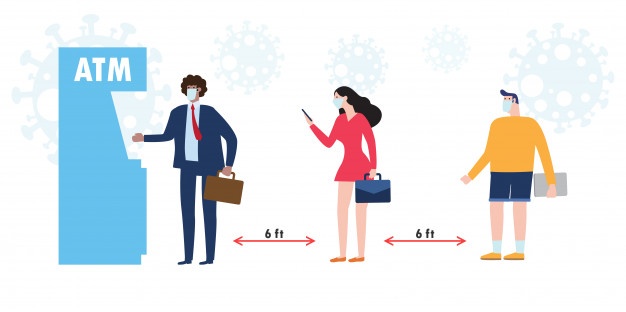The risk of catching coronavirus from frequently touched surfaces such as ATMs, petrol pumps and pedestrian crossings is low, according to researchers.
Scientists swabbed hundreds of supermarket door handles, post boxes and bin lids between April and June last year, during the first wave. But they only detected COVID-19 29 times — or eight per cent of samples.
- Nigeria, Cuba to collaborate on COVID-19 vaccine production
- Okonjo-Iweala: I was surprised Trump blocked my WTO Job
And even when the virus was identified, it was in amounts so small the researchers said the risk of infection was ‘low’ — estimated to be as little as one in 2,000.
The study carried out in the 700,000-strong city of Boston, Massachusetts, adds to an increasing body of evidence that COVID-19 is not regularly spread by touch.
Researchers say droplets containing the SARS-CoV-2 virus emitted when an infected person coughs, sneezes or talks are the main way the disease is passed on.
This study adds to mounting evidence that aerosol droplets are the main way the virus jumps between people.
Despite insisting contaminated surfaces play a minimal role in transmission, experts say people should still sanitise their hands to stay safe. They argue the virus can still enter the body when infected hands touch the nose and mouth.
Positive swabs for the virus also came from bins, and from the door handles of off-licences.
The results showed although the virus was found on bin handles and the doors of off-licences, the quantities were thought to be too small to trigger an infection.
The researchers from Tufts University, also in Massachusetts, swabbed the selected surfaces in the city almost every week to identify whether the virus was regularly present on surfaces.
They found samples were more likely to be positive when there was a higher infection rate, but dropped when fewer residents were testing positive for the virus.
“The estimated risk of infection from touching a contaminated surface was low (less than five in 10,000),” they wrote.
“This suggests fomites (objects likely to carry infection) play a minimal role in SARS-CoV-2 community transmission.”
They also suggested their system could be used to identify an emerging outbreak of COVID-19 before it is picked up by testing, which is generally a week behind because it can take this long for an infected person to develop symptoms and get swabbed.
“Environmental surveillance of SARS-CoV-2 RNA on high-touch surfaces may be a useful tool to provide early warning of Covid-19 case trends,” they added.
The study was published as a pre-print on medRxiv.
The researchers added they did not check surfaces in the home, such as kitchen tables and desks where people may cough and sneeze, which could carry higher levels of the virus if someone is infected.
England’s chief medical officer Chris Whitty has repeatedly warned that the virus is spread through droplets in the air.
The government’s ‘Hands Face Space’ campaign urges people to ensure they have washed their hands, used a mask where appropriate and maintained social distancing.
It states these are the three most effective ways to limit the spread of the virus. It also warns that in an indoor setting, respiratory droplets from an infected person can spread, and that only a mask may reduce their dispersal.

 Join Daily Trust WhatsApp Community For Quick Access To News and Happenings Around You.
Join Daily Trust WhatsApp Community For Quick Access To News and Happenings Around You.


